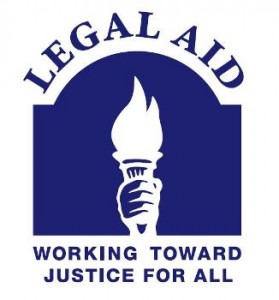Facing Huge Cuts, Legal Aid Is Going to Change
Last year, when Congress was planning one of the biggest budget-cutting sprees in the country’s history, I wrote about how the federal funding to various legal aid organizations across the country was probably going to be significantly cut. What this means for legal aid organizations, and the people who depend on them, remains to be seen.
Well, most of those cuts passed, and now it’s time to pay the piper: many of these cuts are taking effect this year, and a large number of legal aid organizations are planning major layoffs. First, the numbers: the 2012 federal budget cuts funding to the Legal Services Corporation (a federally-owned corporation that’s responsible for distributing federal funds to legal aid groups across the country) by 14% from its 2010 levels. Funding has dropped from $404 million to $348 million. Now, a 14% reduction in an organization’s budget is certainly significant, but it’s probably not catastrophic. However, most of the groups that rely on these funds already operate on a shoestring budget.
A survey of legal aid organizations across the country shows that most of them are planning layoffs of attorneys, paralegals, and other staff. On average, they’ve reported that they plan to reduce their staff of attorneys by 13%, paralegals by 15% and other support staff by 12%. This is obviously pretty significant, especially since the vast majority of these organizations already receive more requests for legal help than they can accommodate. While the exact outcome of these cuts is impossible to predict, one thing is virtually guaranteed: legal aid organizations will have to turn away more clients in genuine need of legal help, who would otherwise qualify.
And we’re still dealing with the consequences of the massive job losses that happened during the recession of 2008 and 2009, so the number of people living in poverty is higher than it’s been at almost any point in our country’s history, meaning that more people will be seeking the services of fewer lawyers.
On top of all this, the layoffs of employees at legal aid centers means that there will be even more unemployed legal professionals seeking work in a legal job market that’s already oversaturated. Of course, if you’re an average person looking for affordable legal help, the fact that there are some out-of-work lawyers is probably the least of your worries. Nevertheless, lawyers are (for the most part) human beings, and a fairly large number of them are going to be out of a job very soon because of the actions of Congress.
In order to compensate for this, it seems pretty clear that legal aid organizations should start looking for alternative sources of funding, reducing their dependence on federal funds. As the last few years have shown, the political climate in Washington can turn on a dime, and small but important programs (funding legal services for the poor, for instance) which were once uncontroversial can suddenly become hot-button issues, and targets of attacks that politicians can use to score political points. Basically, no program is safe.
So, what should legal aid organizations do? Well, most of them get a significant amount of money from private donations. They may want to start diverting their limited resources away from lobbying Congress for funds, and toward soliciting donations from private parties. And while state governments are also cash-strapped, at least some might be inclined to partially make up for the shortfall in federal funds.
 For example, California has recently begun implementing a law that provides funding for indigent parties in civil cases which deal with the basic human needs of the party, such as shelter and healthcare. This so-called “civil Gideon” rule, if it proves successful, could serve as a model for other states to follow.
For example, California has recently begun implementing a law that provides funding for indigent parties in civil cases which deal with the basic human needs of the party, such as shelter and healthcare. This so-called “civil Gideon” rule, if it proves successful, could serve as a model for other states to follow.
But most state governments, as well as the federal government, seem unable to see past their own noses, budget-wise. They’re concerned about reducing government debt and deficits as much as possible, as quickly as possible. These are both important goals. However, there are other things that need to be taken into account, like the overall economy, which is linked to, but not the same thing as, the budget.
For example, if a person is unlawfully fired from their job, but can’t afford any type of legal representation, and legal aid organizations are unable to help, it’s highly unlikely that this person will have any type of recourse. This person will then have less money to spend, which, when aggregated with many similar incidents, will have a significant negative impact on the economy.
Still, it’s unlikely that many state governments are interested in following California’s lead and guaranteeing access to legal counsel in some civil cases, let alone funding such a mandate. However, I think that such a law would, eventually, pay for itself. By helping consumers pursue legal recourse against unlawful termination, foreclosure, denial of access to healthcare, and other things that significantly impact one’s earning potential, there will be an additional (though admittedly small) layer of security in the social safety net.
If people know that they’re unlikely to be foreclosed upon even when they’ve made all their payments, be fired for unlawful reasons, or suffer other legal harm that occurs in the private sector. This would probably increase consumer confidence, increasing spending, and therefore improving the economy, and creating a larger tax base.
Hopefully, we’ll come to our senses soon.


Comments